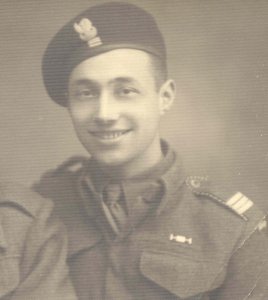
Jerzy Nachtman,
a.k.a. "Kazimierz Olecki"
Platoon commander and Officer Cadet
company "Warszawianka"
Home Army concentration "Chrobry II"
The Witnesses' Uprising Reports
The Warsaw Uprising
 |
Jerzy Nachtman, |
A break out of the Warsaw Uprising took us, the soldiers of the National Armed Forces (Narodowe Siły Zbrojne - NSZ), by surprise. Before August 1, 1944 we were staying in a house in the Bonifraterska street, from where we were to control the Factory of Stock (Wytwórnia Papierów Wartościowych) in order to gain the means to take the cadre westwards (from Warsaw to Bory Tucholskie).
The action was to begin about 11 o'clock. Together with three friends (Ryszard Rawicz-Twaróg a.k.a.. "Guga", Władysław Strumiłło a.k.a. "Krakowiak" and Stanisław Wierzbicki a.k.a. "Kieł") I was to drive a car (Opel Olimpia) towards an entrance to the building and, wearing German uniforms, take the guardhouse under our control. After that, we were to let a truck (driven by Kazik Wierzbicki a.k.a. "Pantera) drive in, accompanied by a group of about 12 people, who, helped by members of our organization employed in the Factory of Stock, were to possess the whole terrain and disarm the Germans inside the building. Outside there was strong protection, particularly from the direction of the Citadel where a cart with vegetables and a hidden light machine gun was situated.
About 10 a.m. a liaison officer from the factory came with a message that a company of the German army had arrived and located on the courtyard. In such circumstances, the action was cancelled. While waiting for the spread of events, about 12 o'clock, we heard the shooting from the direction of Żoliborz and we saw the divisions of military police on their way towards that place. In this situation I phoned the commander Tadeusz Siemiątkowski a.k.a.. "Tadeusz Mazur" asking him what to do. I got an order to make our division situate at the Żelazna street region.
Some people left on foot only with small arms. "Guga", "Kieł" and I got into Opel and drove towards the Żelazna street. We were followed by a truck driven by "Pantera", with 10 people under the truck's tarpaulin. In the car all of us were wearing German uniforms; in the truck the driver and "Benek" sitting next to him were looking similar. We were driving forward, ignoring signs given by the Germans to stop.
In the Senatorska street at last, in front of the church, a military police patrol, having seen that we were not reacting, jumped out on the road and aimed the guns at us. By open windows "Guga" and I started to shoot using Schmeisers. Simultaneously, grenades were thrown from the truck. Increasing the car speed, we went past the Theatre Square, reached the Elektoralna street and, in order to omit the shooting from the Senatorska street, we turned into the Orla street.
We stopped the cars and started to leave them. Near one of the buildings' gateway there stood a group of civilians, one of whom had a rifle. They did not know what to do seeing military people who were taking off their uniforms and armed civilians. "Guga" recognized his friend among those people and everything became clear. It was a Home Army squad that was preparing to the action. From them we got white-red bands.
On the grounds that there was shooting coming from Leszno, the Theatre Square and the Elektoralna street, I decided to barricade ourselves inside the following streets: the Przechodnia, the Rynkowa, the Graniczna and the Ptasia, and wait until the dusk. Civilians were greeting us with enthusiasm and with anxiety as well because of German cars that were driving along the streets and communicating by means of loudspeakers that the population of each house from which a shot would be fired would be executed.
Being a commander of a well-armed squaw, I was irresolute. Moreover, many volunteers were coming to me, asking for weapons. We waited until the dusk and we changed our place of stay; we went to the former Lubomirski Palace. Not far from here, in the Mirowska Hall there were still those Germans who were unable to escape to the Saski Garden, where there was their bigger assembly. We did not allow anybody to lean out of the Hall as we would shoot immediately.
In the meantime a "navy blue policeman" came and said that this was his terrain and he knew an entrance to the Hall underground, where fat storehouses were situated. He proposed that he would set fire to the hall cellars and make the Germans run away. When the Hall started to burn, I ran towards the gate and threw a grenade inside. A moment later I heard a voice coming from the inside: "Guys, take us, don't kill us." I shouted, "Come out. Hands on a head." After a while they started to come out one by one. The captives were taken at the Solna street by "the guys from Bródno": "Benek" and "Michałko" who searched them and took their shovels and equipment away. We were trying to take weapons out of the burning Hall. We enriched ourselves: we got four rifles and a machine gun "Dreiser" as well as ammunition.
I created the squaw. 18 of us were well-armed: 2 Schmeisers, 1 Sten, Bergman, 4 kb, 1 erkaem and handguns apart from that. I got to know that a command was being organized in the Twarda street, so I went there and reported my squad to an commander of a "Chrobry" noncentration, Major "Lig" who was a NSZ officer. He appointed us to his discretionary squad and gave us two nurses and a liaison officer.
He told us to surprise a German personnel of Pasta and to try to occupy it that night. The Germans who were staying there were a nuisance because they were shooting the whole surroundings. Taking them unawares was out of question, unfortunately. If somebody tried to come near them, they would launch "parachuting" rockets, so-called Flary that would shed light on the whole area and they would shoot so nobody could lean out. A mere act of throwing a trick on a street was followed by an immediate gunfire. There was a drizzle and this is how the dawn came but even at that time any trial to surprise the Germans was impossible.
In the morning we came back to the Twarda street. In the afternoon we got an order to force out własowcy who had got into Kazimierz Square (nowadays there is a printing house "A House of a Word" there) from the direction of the Towarowa street and started to bring people out of their houses. We reached there from the Sienna and Miedziana streets and started to shoot in the direction of the enemy. They got into panic, took several dead and wounded people and quickly moved back beyond a concrete hoarding on the other side of the Towarowa street.
Our squad was guided to different actions. We were trying to possess "Astoria" hotel in the Chmielna street, we were discussing about the possibilities of attacking the Main Railway station, we were fighting in the Towarowa street in the storehouses of the Hartwig firm. While we were trying to attack Nordwache in the corner of the Żelazna and Chłodna streets (on roofs as there was no other possibility because there was a concrete bunker in the corner) "Krakowiak" became wounded. We were preying on "gołębiarze" (people who would shoot while being on building roofs - the translator's gloss), as well, purifying the area.
After about a week of fights I got to know that in the Railway House in the Chmielna street a concentration of NSZ was being created. Major "Lig" allowed me to join it. I reported my squaw and it turned out that this was a "Warszawianka" company and my chief Tadeusz Siemiątkowski a.k.a. "Tadeusz Mazur", who organized the first platoon, was second in command. I became his deputy and a commander of the first squad, the one I brought along.
Similarly to the previous situation when we were with "Lig", as the best-armed squad we were "Emergency". We were directed to the dangerous places. We were fighting in the Jerozolimskie Avenues, in the Krochmalna and Waliców streets under the commands of Captain "Proboszcz", in the Towarowa street. We were taking part in the trial of breaking to the Old Town. The first squad gained a building of Water Supply and Sewerage Systems in the Starynkiewicza square. .
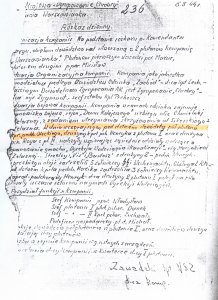
A day order of "Warszawianka" company
In October the Germans hoisted a white flag from a balcony of a building in the Jerozolimskie Avenues in the corner of the Starynkiewicza square and by means of a loudspeaker they asked for the cessation of arms and for the officers with the flag of truce from General Bor to come. After the consultation with the commands we were told to come into contact and arrange a presumable meeting the following day. Corporal "Bankier", who had a good commands of German, was given an extra star - he became Major. He - with a white-red band on a civilian coat (insignia of Major rank on coat's shoulder-straps), "Krakowiak" and I fully-armed - both with Schmeisers, each of us had 7 magazines, also grenades, wearing German helmets and camouflage jackets with white-red bands - we arrived. Simultaneously two Germans and a soldier handing a white flag went towards us. They had no weapons.
The first question they asked us was why the officers with the flag of truce had weapons. Our Major answered, saying that we had bad experience and could not believe them. We told them that we came from the commands of that section and that we appointed a meeting for the following day. The next day, Captain "Lech Żelazny", our battalion commander was accompanied by a civilian, a short man wearing knickerbockers. As it turned out, it was Colonel Wachnowski. For that arranged meeting he came together with Bankier" and "Krakowiak" (this time having no weapons). Such was the beginning of negotiations concerning the Warsaw capitulation.
When the capitulation had been proclaimed, we hid weapons in good condition as well as a "Warszawianka" banner under the floor of a workshop in the region of the Railway House. In the morning I met a railway man who told me that he had arrived from Ursus in order to look for his family. The Germans in the Jerozolimskie Avenues let him go near the West Railway station, telling him to come back the same way in the evening.
I arranged matters with "Krakowiak" and we decided not to agree to be taken captive. Before an evening, together with him and his fiancée (later his wife), both wearing Railway uniforms, we reached the West Railway stadion. With the help of a track-walker we went to Skierniewice by a steam locomotive and then to Cracow by train. During night, on foot, we reached neighbouring Księżniczki where a family of "Krakowiak" lived.
I stayed here for about a week and afterwards I went to Częstochowa where - with the help of my friends - I got false papers allowing me to go to work as a labourer to a place called Feldkirchen on a Austrian-Swiss border.
Volunteers for work were allowed to choose a place where they wanted to work. In Feldkirchen I was working in a shoemaker's place for several days. Then, I got to know from the Polish people working there that a tractor's driver was needed in a pontoon factory in a neighbouring Getzis. I reported myself in Arbeitsamt as a driver and started this work.
Several days later a Polish man who was working in a town hall as a tractor driver told me that he was also ploughing a municipal field situated by the border (it was the land boarder because the Rhein had changed its riverbed). We both agreed that he would "fall ill" on Monday. The man showed me how to place a plough to a tractor and how to plough a field.
On Monday it was raining a bit. I went to the field, placed a plough and was roaming the field. It adjoined the embankment on which watch-towers were situated every 200-300 meters. After some time the guards got used to my work and did not look out of their watch-towers (it was raining). I drove up the embankment and left the working tractor. I jumped onto the embankment and parted barbed wires that were twisted spirally. I jumped onto jacks with the barbed wire. At that moment a guard noticed me. I knew he could shoot in such a way not to hurt anybody. I was determined; I started to run. After several minutes I stayed on the other side of the border. I was free.
From Switzerland I was trying to get to France. Trying for the third time, I was lucky. Having stayed in France for six weeks I was sent to the Second Corps in Italy. It was on January 17, 1945, to be precise.
Jerzy Nachtman
translated by Monika Ałasa
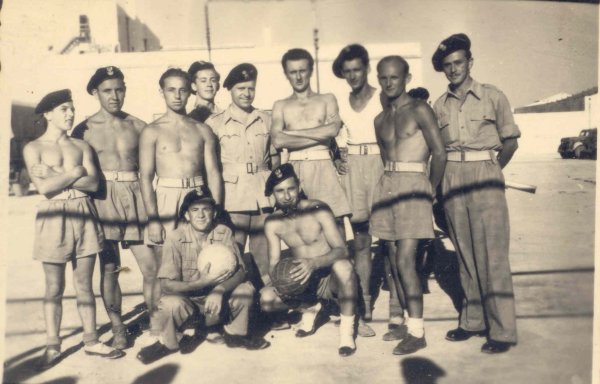
A group of young soldiers of the Second Corps in Italy
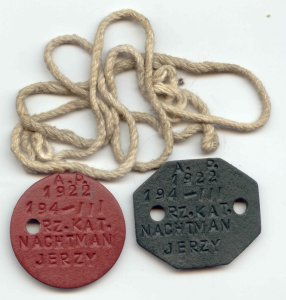
A soldier "Nieśmiertelnik" of Jerzy Nachtman from the Second Corps
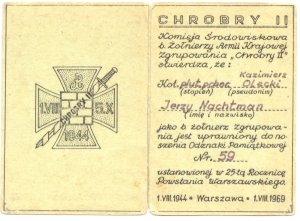
A membership card confirming the affiliation to a "Chrobry I" group
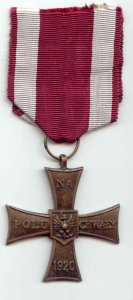
The Cross of the Brave
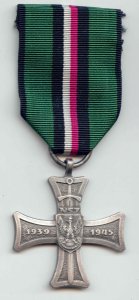
The Cross of the National Armed Deed of the National Armed Forces (NSZ)
Jerzy Nachtman,
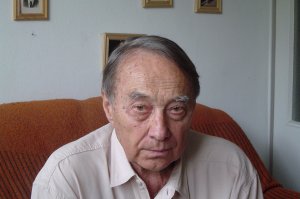
ps. "Kazimierz Olecki"
plut. podch.,
komp. "Warszawianka"
Zgrupowanie AK "Chrobry II".
Copyright © 2006 Maciej Janaszek-Seydlitz. All rights reserved.